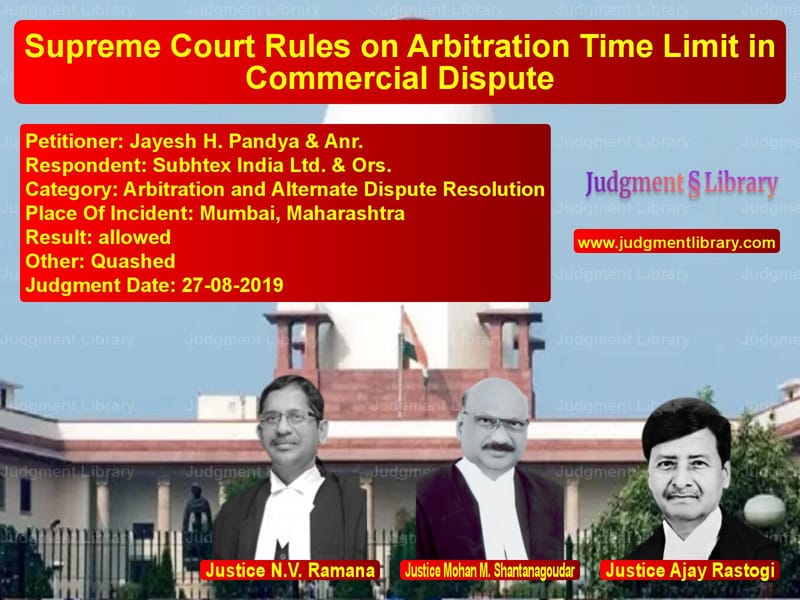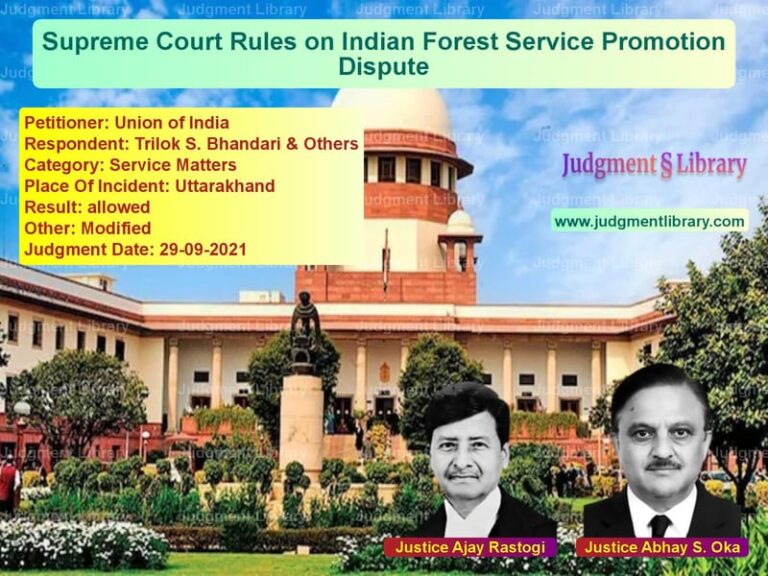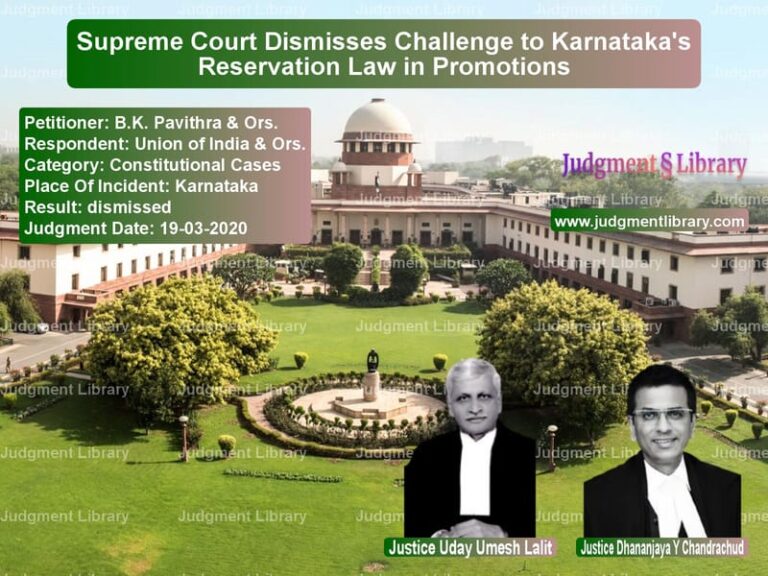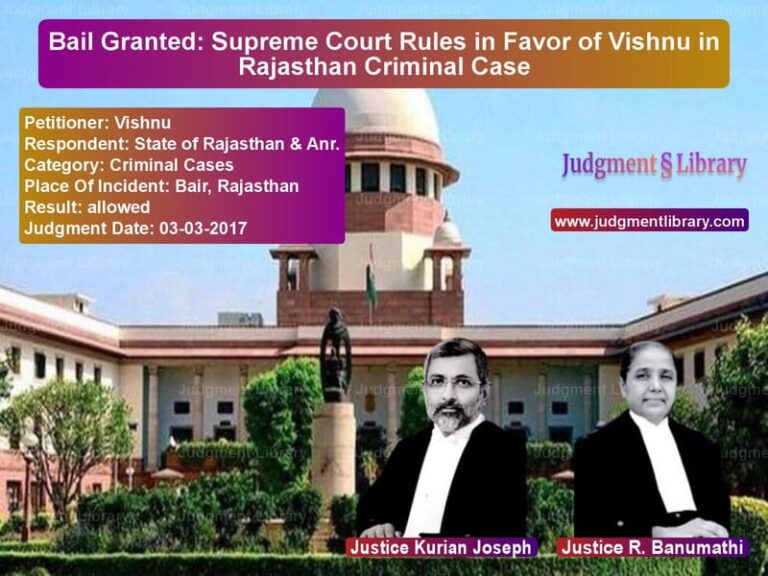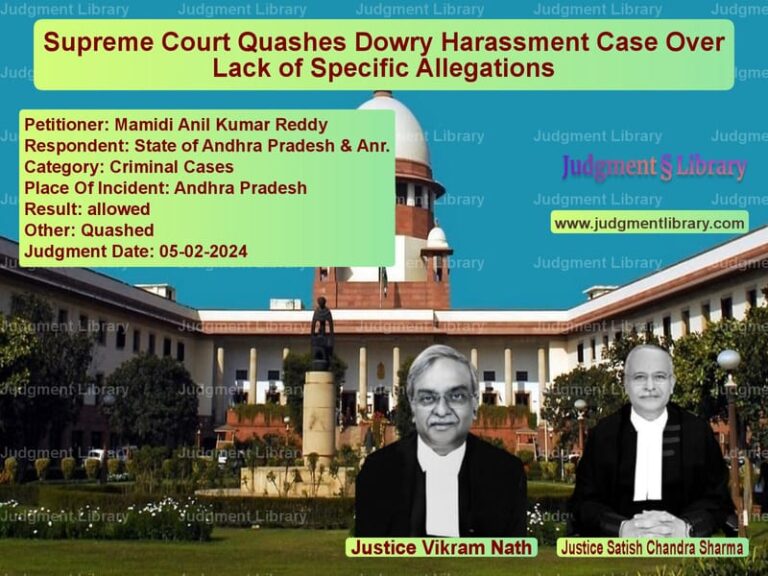Supreme Court Rules on Arbitration Time Limit in Commercial Dispute
The case of Jayesh H. Pandya & Anr. vs. Subhtex India Ltd. & Ors. revolves around the validity of an arbitration process exceeding its stipulated time limit. The Supreme Court, in its judgment dated 27th August 2019, ruled that an arbitrator’s mandate terminates if the arbitration proceedings extend beyond the agreed period without consent from both parties. This case highlights the importance of adherence to arbitration agreements in commercial disputes.
Background of the Case
The appellants, Jayesh H. Pandya & Anr., were partners in Hetali Construction Company, while the respondent, Subhtex India Ltd., initiated arbitration proceedings under an agreement dated 28th April 2000. The arbitration agreement mandated that the arbitrator must make an award within four months of receiving the agreement. Additionally, the agreement stipulated that the arbitrator could extend the timeline only with the consent of both parties.
After initial delays, the arbitration process was set in motion, and a former Supreme Court judge, Justice V.D. Tulzapurkar, was appointed as the sole arbitrator. However, he passed away in 2004, leading to the appointment of Justice S.N. Variava as the substitute arbitrator in 2007. The first preliminary meeting took place on 4th May 2007, setting the deadline for the award as 4th September 2007. The appellants refused to consent to any extension, leading to a dispute over the arbitrator’s authority.
Key Issues in Dispute
- Whether the arbitration process could continue beyond the stipulated four-month period without mutual consent.
- Whether the arbitrator’s mandate automatically terminated due to exceeding the agreed timeline.
- Whether the High Court erred in allowing the arbitration to proceed despite the time limit expiration.
Arguments by the Petitioner (Jayesh H. Pandya & Anr.)
- The arbitration agreement clearly stated that proceedings must conclude within four months.
- The arbitrator had no authority to extend the period without mutual consent.
- The arbitrator had become functus officio (lost jurisdiction) once the time expired on 4th September 2007.
- Allowing arbitration beyond the agreed period would be a violation of the Arbitration and Conciliation Act, 1996.
Arguments by the Respondents (Subhtex India Ltd. & Ors.)
- The delays were procedural and necessary for fair arbitration.
- The appellants actively participated in arbitration and thus waived their right to object.
- The High Court correctly upheld the continuation of the arbitration proceedings.
- Striking down the arbitration would defeat the objective of the Arbitration and Conciliation Act.
Supreme Court’s Observations
1. Arbitration Must Adhere to Contractual Timelines
The Supreme Court emphasized that arbitration agreements must be followed strictly. It stated:
“When parties agree on a time limit for arbitration, any extension must comply with the agreed conditions. If no mutual consent exists, proceedings cannot continue beyond the stipulated period.”
2. Waiver of Rights Requires Clear Intent
The Court ruled that participation in arbitration does not automatically imply waiver of rights. It observed:
“Waiver is a voluntary and intentional relinquishment of a right. The appellants consistently objected to the extension, showing no intent to waive their right.”
3. The Arbitrator’s Mandate Had Expired
The Court held that once the four-month period lapsed, the arbitrator lost authority unless both parties consented to an extension. It noted:
“The arbitrator became de jure unable to act, and the mandate automatically terminated under Section 14 of the Arbitration and Conciliation Act, 1996.”
4. The High Court’s Error in Extending Arbitration
The Supreme Court found that the High Court erred in allowing arbitration to continue. It ruled:
“The High Court’s order permitting the continuation of arbitration despite explicit contractual terms is unsustainable.”
Final Verdict
- The Supreme Court set aside the High Court’s ruling.
- The arbitrator’s mandate was declared terminated due to exceeding the agreed timeline.
- The respondents were given the liberty to initiate fresh proceedings as per the law.
Implications of the Judgment
- Reaffirms that arbitration must adhere to agreed timelines.
- Clarifies that an arbitrator’s authority automatically terminates if the agreed time period lapses.
- Prevents misuse of arbitration extensions without mutual consent.
- Strengthens contractual enforcement in arbitration agreements.
Conclusion
The Supreme Court’s ruling in this case underscores the importance of adherence to arbitration agreements. By enforcing time limits strictly, the judgment ensures procedural discipline in commercial arbitration. This ruling sets a precedent for businesses and legal practitioners dealing with arbitration disputes, emphasizing that time-bound arbitration agreements must be honored as per contract terms.
Petitioner Name: Jayesh H. Pandya & Anr..Respondent Name: Subhtex India Ltd. & Ors..Judgment By: Justice N.V. Ramana, Justice Mohan M. Shantanagoudar, Justice Ajay Rastogi.Place Of Incident: Mumbai, Maharashtra.Judgment Date: 27-08-2019.
Don’t miss out on the full details! Download the complete judgment in PDF format below and gain valuable insights instantly!
Download Judgment: Jayesh H. Pandya & A vs Subhtex India Ltd. & Supreme Court of India Judgment Dated 27-08-2019.pdf
Direct Downlaod Judgment: Direct downlaod this Judgment
See all petitions in Arbitration Act
See all petitions in Enforcement of Awards
See all petitions in Institutional Arbitration
See all petitions in Judgment by N.V. Ramana
See all petitions in Judgment by Mohan M. Shantanagoudar
See all petitions in Judgment by Ajay Rastogi
See all petitions in allowed
See all petitions in Quashed
See all petitions in supreme court of India judgments August 2019
See all petitions in 2019 judgments
See all posts in Arbitration and Alternate Dispute Resolution Category
See all allowed petitions in Arbitration and Alternate Dispute Resolution Category
See all Dismissed petitions in Arbitration and Alternate Dispute Resolution Category
See all partially allowed petitions in Arbitration and Alternate Dispute Resolution Category

